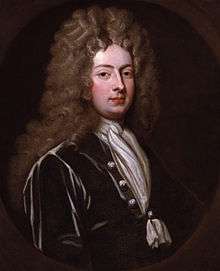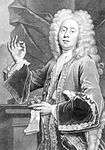William Congreve
| William Congreve | |
|---|---|
 William Congreve in 1709 by Godfrey Kneller | |
| Born |
24 January 1670 Bardsey, England |
| Died |
19 January 1729 (aged 58) London, England |
| Occupation | Playwright, poet |
| Nationality | English |
| Period | 1693–1700 |
William Congreve (24 January 1670 – 19 January 1729) was an English playwright and poet.
Early life
William Congreve was born in Bardsey, West Yorkshire, England (near Leeds).[note 1] His parents were William Congreve (1637–1708) and Mary (née Browning; 1636?–1715). The family moved to London in 1672. They relocated again in 1674 to the Irish port town of Youghal where his father served as a lieutenant in the British army. Congreve spent his childhood in Ireland, where his father, a Cavalier, had settled during the reign of Charles II. Congreve was educated at Kilkenny College where he met Jonathan Swift, who would be his friend for the remainder of his life; and at Trinity College in Dublin. Upon graduation, he matriculated in the Middle Temple in London to study law, but felt himself pulled toward literature, drama, and the fashionable life. Congreve assumed the pseudonym Cleophil and went on to publish a work he had written at the approximate age of 17 called Incognita: or, Love and Duty reconcil'd in 1692. This early work gained him recognition among the men of letters and an entrance into the literary world. Artistically, he became a disciple of John Dryden whom he met through the gatherings of literary circles held at Will's Coffeehouse in the Covent Garden District of London. John Dryden would continue to be a massive supporter of the works of Congreve throughout his life. This support would take the form of panegyrical introductions for some of Congreve's later works.
Literary career
William Congreve is seen as the man who shaped the English comedy of manners through his use of satire and well written dialogue. Congreve achieved fame in 1693 when he wrote some of the most popular English plays of the Restoration period. This period in time was unique because female roles were beginning to be played predominately by women. This shift in allowing women to perform could be seen in the works of Congreve. One of the favorites of the playwright was a woman by the name of Mrs Anne Bracegirdle. She was the actress that went on to hold many of the female lead roles in the works of Congreve. His first play, The Old Bachelor, written, by his own account, to amuse himself during convalescence, was produced at the Drury Lane Theatre in 1693 and later produced by the Theatre Royale. This first play was hailed as an enormous success, and it ran for an entire two-week period when it first opened. Congreve's mentor John Dryden gave the production rave reviews and proclaimed it to be a brilliant first piece. The second play to be produced was called The Double-Dealer which was not nearly as successful as the first production. By the age of thirty, he had written four comedies, including Love for Love (premiered 30 April 1695) staged in Lincoln's Inn Field which was nearly as well received as the first major success for Congreve, and The Way of the World (premiered March 1700). This play was an utter failure at the time of production but it is seen as one of his masterpieces today, and it is still frequently revived. He also went on to create one tragedy, The Mourning Bride (1697) which was extremely popular at the time of creation but is now one of his least regarded dramas. After the production of Love for Love, Congreve became one of the managers for the Lincoln's Inn Fields in 1695. During that time, he went on to write public occasional verse. As a result of his success and literary merit, he was awarded one of the five positions of commissioner for licensing hackney coaches.
His playwrighting career was successful; however, it was also very brief. Five plays authored from 1693 to 1700 would prove the entirety of his output, as public tastes turned away from the sort of high-brow sexual comedy of manners in which he specialized. It is believed that Congreve was forced off of the stage due to growing concerns about the morality of the comedies that Congreve was producing. He reportedly was particularly stung by a critique written by Jeremy Collier (A Short View of the Immorality and Profaneness of the English Stage), to the point that he wrote a long reply, "Amendments of Mr. Collier's False and Imperfect Citations." Although no longer on the stage, Congreve continued his literary art. He wrote the librettos for two operas that were being created at the time, and he also went on to begin translating the works of Molière. As a member of the Whig Kit-Kat Club, Congreve's career shifted to the political sector, where he held various minor political positions, including being named Secretary of the Island of Jamaica by George I in 1714, in spite of being a Whig among Tories. Regardless of this career change Congreve continued his writing, although it was in a very different style. During his time in Jamaica, his works now took the form of poetry instead of full length dramatic productions. During that time, he did a vast amount of translations as well, including works of Homer, Juvenal, Ovid, and Horace.
Later life
Congreve withdrew from the theatre and lived the rest of his life on residuals from his early work, the royalties received when his plays were produced, as well as his private income. His output from 1700 was restricted to the occasional poem and some translation (notably Molière's Monsieur de Pourceaugnac). Congreve never married; in his own era and through subsequent generations, he was famous for his friendships with prominent actresses and noblewomen for whom he wrote major parts in all his plays.These women included Anne Bracegirdle and Henrietta Godolphin, 2nd Duchess of Marlborough, daughter of the famous general, John Churchill, 1st Duke of Marlborough. Congreve and Henrietta probably met by 1703 and the duchess had a daughter, Mary (1723–1764), who was believed to be his. Upon his death he left his entire fortune to the Duchess of Marlborough.
As early as 1710, he suffered both from gout and from cataracts on his eyes. Congreve suffered a carriage accident in late September 1728, from which he never recovered (having probably received an internal injury); he died in London in January 1729, and was buried in Poets' Corner in Westminster Abbey.
Famous lines
| Wikiquote has quotations related to: William Congreve |
Two of Congreve's turns of phrase from The Mourning Bride (1697) have become famous, albeit frequently in misquotation, and often misattributed to William Shakespeare:[2]
- "Musick has charms to soothe a savage breast," which is the first line of the play, spoken by Almeria in Act I, Scene 1. (This is often misquoted as "Music has charms to soothe the savage beast".)
- "Heaven has no rage like love to hatred turned, Nor hell a fury like a woman scorned," spoken by Zara in Act III, Scene VIII.[3] (This is usually paraphrased as "Hell hath no fury like a woman scorned")
Congreve coined another famous phrase in Love for Love (1695):
- "O fie, miss, you must not kiss and tell."
References in popular culture
A fictitious play by Congreve, The Gallivant, features prominently in the novel Flowers for the Judge by Margery Allingham.
In British TV series The Hustle in first season fifth episode, main protagonists attempt to pull out a con concerning bitter woman named after Congreve.
In season 7 of Star Trek Next Generation counselor Troi refers to "Hell hath no fury like a woman scorned" at 43:49 in the episode Eye of the Beholder.
Quotes from numerous Congreve works head a number of chapters in Robert Galbraith's (J.K Rowling) second Cormoran Strike novel The Silkworm.
Works
| Wikisource has original works written by or about: William Congreve |
- The Old Bachelor (1693)[4]
- The Double Dealer (1694)[5]
- Love for Love (1695)[6]
- The Mourning Bride (1697)[7]
- The Way of the World (1700)[8]
See also
Notes
- ↑ Samuel Johnson doubted Congreve's claim to have been born in Bardsey, Yorkshire in 1670 ("Neither the time nor place of his birth are certainly known; if the inscription upon his monument be true, he was born in 1672. For the place; it was said by himself, that he owed his nativity to England, and by every body else that he was born in Ireland."), and berated him for disowning his native country. However, Edmond Malone later found a baptism entry for Congreve in the Register of Bardsey, in the West Riding of York that would seem to prove that Congreve was not lying when he said that he was born in England: "William, the sonne of Mr. William Congreve, of Bardsey grange, was baptised 10 February 1669 [i.e. 1670 by the modern reckoning of the new year]".[1]
References
- ↑ Johnson, Samuel (1861). Cunningham, Peter, ed. Lives of the most eminent English poets. New York: Derby and Jackson. p. 15.
- ↑ "You are [mis]quoting Shakespeare". Folger SHAKESPEARE LIBRARY. Retrieved 3 November 2015.
- ↑ The mourning bride: a tragedy – Google Books. Books.google.co.uk. Retrieved 15 November 2010.
- ↑ The Old Bachelor: A Comedy by William Congreve.
- ↑ The Double-Dealer: A Comedy by William Congreve.
- ↑ Love for Love: A Comedy by William Congreve.
- ↑ Congreve, William (1 January 1753). The Mourning Bride: A Tragedy. J. and R. Tonson and S. Draper in the Strand.
- ↑ The Way of the World by William Congreve.
Sources
- Congreve, William. The poetical works of William Congreve. With the life of the author. Cooke's edition. Embellished with superb engravings. London, [1796]. Eighteenth Century Collections Online. Gale. California State Univ, Northridge. 3 November 2015
- Klekar, Cynthia. "Obligation, Coercion, and Economy: The Gift of Deed in Congreve’s The Way of the World." In The Culture of the Gift in Eighteenth-Century England, ed. Linda Zionkowski and Cynthia Klekar. New York: Palgrave MacMillan, 2009.
- "Love for Love." Drama for Students. Ed. Jennifer Smith. Vol. 14. Detroit: Gale, 2002. 175-205. Gale Virtual Reference Library. Web. 3 November 2015.
- Macaulay, Thomas Babington. The Comic Dramatists of the Restoration. London, Longman, Brown, Green, and Longmans, 1853.
- The Editors of Encyclopædia Britannica. "William Congreve." Encyclopedia Britannica Online. Encyclopedia Britannica, n.d. Web. 07 Apr. 2016.
- Dobrée, Bonamy. William Congreve. London: Published for the British Council and the National Book League by Longmans, Green, 1963. Print.
- Thomas, David. "Life and Work." William Congreve. Ed. Bruce King. New York: St. Martin's, 1992. 1-14. Print.
External links
| Wikimedia Commons has media related to William Congreve. |
- Biography
- Works by William Congreve at Project Gutenberg
- Works by or about William Congreve at Internet Archive
- Works by William Congreve at LibriVox (public domain audiobooks)

- William Congreve at Find a Grave
